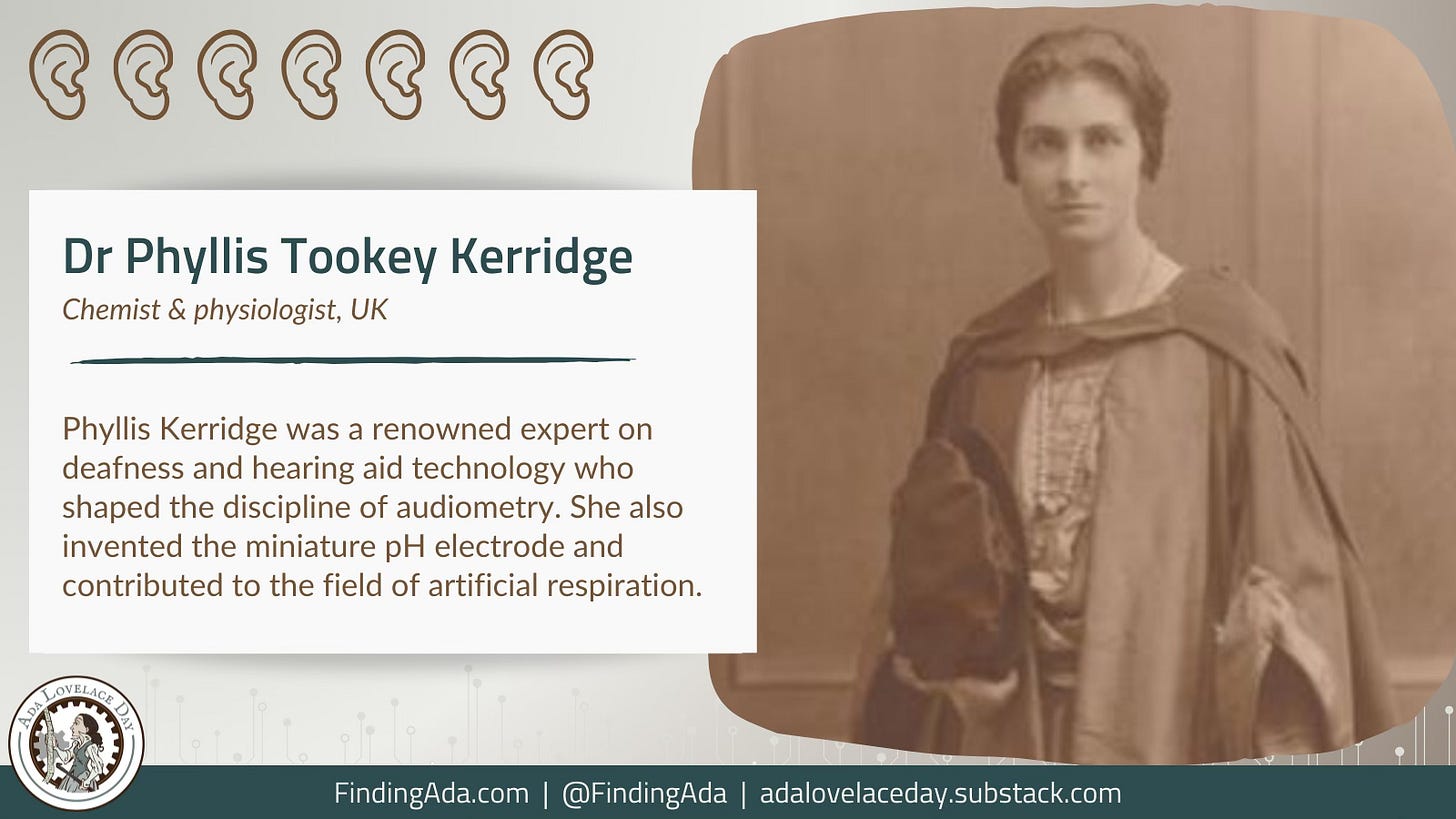Dr Phyllis Margaret Tookey Kerridge, Chemist and Physiologist
Phyllis Kerridge was a pioneering chemist and physiologist whose research laid the foundation for the creation of standardised hearing aids.
Dr Phyllis Margaret Tookey Kerridge
Dr Phyllis Margaret Tookey Kerridge was a pioneering chemist and physiologist whose research laid the foundation for the creation of standardised hearing aids. A renowned scientist and educator whose work spanned fields including medicine, physiology and otology in the 1920s and 30s, she played a key role in establishing hearing aid clinics for the deaf. She is also notable for her invention of the miniature pH electrode and her work on artificial respiration.
Kerridge was born Phyllis Margaret Tookey in April 1901 in Bromley, Kent (Kerridge was her married name). She studied chemistry and physics at University College London (UCL), obtaining her honours degree in 1922.
Her first major scientific achievement came in 1925, when she was conducting research for her PhD in biochemistry. Kerridge created the miniature pH electrode, a glass tool that could fit into narrow layers in living tissue to analyse biochemical samples such as blood. She completed her PhD in 1927.
In addition to lecturing in UCL’s department of physiology, Kerridge studied medicine at University College Hospital, qualifying in 1933. She began working with scientific instrument maker Robert Paul, conducting rigorous physiological tests on an early life support device (later known as the Bragg-Paul respirator). Kerridge’s tests and recommendations helped make the device more efficient, comfortable, smaller and simpler, so it could be rolled out into hospitals and even used on newborns.
Later in the 1930s, Kerridge began working at the Royal Ear Hospital in London. Her research – initially on the hearing of London schoolchildren, then expanded to include adults – revolved around the ‘silence room’ at University College Hospital. A large soundproof space equipped with a pure-tone Western Electric Audiometer, this became the centre of Great Britain’s first clinic where people could access free and impartial advice on hearing aid prescriptions. In first-of-their-kind studies, Kerridge used the audiometer to quantify data on hearing thresholds. She said she conducted this research not in pursuit of “new facts, but for measurements, as precise as human material and physical instruments would allow”.
Further clinical tests by Kerridge produced data that was used to improve the Post Office’s amplified telephone service for people with hearing loss. Her research promoted the idea that hearing could be objectively assessed, enabling the NHS to start prescribing standardised hearing aids in 1948. The design of the Medresco, the first NHS hearing aid, was based on phonetic tests co-created by Kerridge.
Kerridge approached her work on deafness with empathy as well as scientific curiosity. She didn’t just want to help people with hearing loss communicate; she wanted them to be able to enjoy socialising and listening to music, too. She was known for striving to include the lived experiences of patients in the prescription of their hearing aids, and worked to design new devices that would give people more autonomy over hearing tests.
Over her long career, Kerridge worked at the Marine Biological Association, Plymouth; the Physiological Laboratory, Cambridge; the Carlsberg Chemical Laboratorium, Copenhagen; the Medical Unit of the London Hospital; and the London School of Hygiene and Tropical Medicine. When the Second World War broke out, she was seconded from University College Hospital to serve the Emergency Medical Service at a hospital in Epping, where she and her colleagues created an improvised laboratory for work in pathology and blood transfusions.
Sadly, it was at this hospital where she contracted an unknown illness. She died on 22 June 1940, aged just 38.
Further Reading
Phyllis Margaret Tookey Kerridge, Wikipedia
Phyllis M. Tookey Kerridge and the Science of Audiometric Standardisation in Britain, Jaipreet Virdi & Coreen McGuire, British Journal for the History of Science, 13 December 2017
Andrea Riseborough, Maternity leave and premature babies, Woman’s Hour, BBC Radio 4, 11 October 2016
Written by Moya Crockett, with thanks to Stylist for their support.




